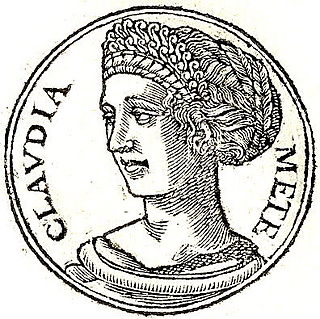See also
- Clodia, sister of Clodius Pulcher
- Leges Clodiae , legislation sponsored by Clodius Pulcher as tribune in the 1st century BC
Clodius may refer to:

Clodius is an alternate form of the Roman nomen Claudius, a patrician gens that was traditionally regarded as Sabine in origin. The alternation of o and au is characteristic of the Sabine dialect. The feminine form is Clodia.
Titus Annius Milo was a Roman political agitator. The son of Gaius Papius Celsus, he was adopted by his maternal grandfather, Titus Annius Luscus. In 52 BC, he was prosecuted for the murder of Publius Clodius Pulcher and exiled from Rome. He was unsuccessfully defended by his friend, Marcus Tullius Cicero, in the speech Pro Milone.

Clodia, nicknamed Quadrantaria, Nola, Medea Palatina by Cicero, and occasionally referred to in scholarship as Clodia Metelli, was one of three known daughters of the ancient Roman patrician Appius Claudius Pulcher.
Publius Clodius Pulcher was a populist Roman politician and street agitator during the time of the First Triumvirate. One of the most colourful personalities of his era, Clodius was descended from the aristocratic Claudia gens, one of Rome's oldest and noblest patrician families, but he contrived to be adopted by an obscure plebeian, so that he could be elected tribune of the plebs. During his term of office, he pushed through an ambitious legislative program, including a grain dole; but he is chiefly remembered for his long-running feuds with political opponents, particularly Cicero, whose writings offer antagonistic, detailed accounts and allegations concerning Clodius' political activities and scandalous lifestyle. Clodius was tried for the capital offence of sacrilege, following his intrusion on the women-only rites of the goddess Bona Dea, purportedly with the intention of seducing Caesar's wife Pompeia; his feud with Cicero led to Cicero's temporary exile; his feud with Milo ended in his own death at the hands of Milo's bodyguards.

The gens Claudia, sometimes written Clodia, was one of the most prominent patrician houses at ancient Rome. The gens traced its origin to the earliest days of the Roman Republic. The first of the Claudii to obtain the consulship was Appius Claudius Sabinus Regillensis, in 495 BC, and from that time its members frequently held the highest offices of the state, both under the Republic and in imperial times.

Fulvia was an aristocratic Roman woman who lived during the Late Roman Republic. Fulvia's birth into an important political dynasty facilitated her relationships and, later on, marriages to Publius Clodius Pulcher, Gaius Scribonius Curio, and Mark Antony. All of these men would go on to lead increasingly promising political careers as populares, tribunes, and supporters of Julius Caesar.

Pro Caelio is a speech given on 4 April 56 BC, by the famed Roman orator Marcus Tullius Cicero in defence of Marcus Caelius Rufus, who had once been Cicero's student but more recently was a political rival. Cicero's reasons for defending Caelius are uncertain, but various theories have been postulated.
Claudia Pulchra was the name of several women of Roman gens of Claudii during the 1st century BC and 1st century AD. The Latin pulchra is the root of the English word pulchritude.
Appius Claudius Pulcher was a Roman noble, general and politician of the 1st century BC. He was the father of a number of renowned Romans, most notable: the infamous Clodius and Clodia.
Publius may refer to:
Marcus Aufidius Lurco also known simply as Aufidius Lurco, was a Roman magistrate who lived in the 1st century BC. Lurco was a member of the gens Aufidia, a Roman family of plebeian status, who appeared in the Roman Republic and Roman Empire. They became a family of consular rank. Lurco originally came from Fundi.
Pulcher is Latin for "beautiful", and may refer to:
Quintus Caecilius Metellus Balearicus was a Roman statesman and general who was elected consul for the year 123 BC.
Leges Clodiae were a series of laws (plebiscites) passed by the Plebeian Council of the Roman Republic under the tribune Publius Clodius Pulcher in 58 BC. Clodius was a member of the patrician family ("gens") Claudius; the alternative spelling of his name is sometimes regarded as a political gesture. With the support of Julius Caesar, who held his first consulship in 59 BC, Clodius had himself adopted into a plebeian family in order to qualify for the office of tribune of the plebs, which was not open to patricians. Clodius was famously a bitter opponent of Cicero.
Caecilia Metella was a Roman matron of the first century BC, who belonged to the powerful family of the Caecilii Metelli. She was possibly the mother of Clodius.
Publius Claudius Pulcher was a son of Publius Clodius Pulcher and his wife Fulvia. He was briefly the brother-in-law of Octavian through Octavian's marriage to his sister Claudia.
Publius Sestius was a Roman politician and governor in the 1st century BC.
Gaius Porcius Cato was a distant relative, probably a second cousin, of the more famous Marcus Porcius Cato, called Cato the Younger. This Cato was probably the son of Gaius Porcius Cato, the homonymous consul of 114 BC, being then the grandson of Marcus Porcius Cato Licinianus and thereby the great-grandson of the famous Cato the Censor, often called Cato the Elder.
Gaius Scribonius Curio was the son of Gaius Scribonius Curio, consul in 76 BC and censor in 61 BC. His political allegiances changed over the course of the 50s BC until his tribunate, when he sided with Julius Caesar after possibly receiving a massive bribe. During the civil war, he sided with Caesar and led Caesarian troops to Sicily and then to Africa, where he was killed in battle.
Publius Claudius Pulcher may refer to: